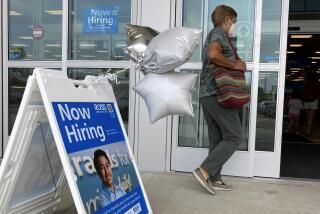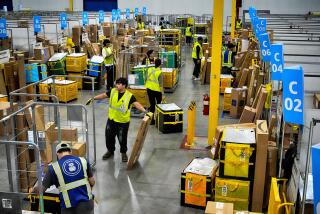Productivity Drops for First Time Since 1995
- Share via
WASHINGTON — American workers’ productivity, whose growth has been widely credited with fueling the nation’s record period of economic growth, declined in the first three months of this year for the first time since 1995, the Labor Department reported Tuesday.
Productivity, a measure of the goods and services produced during each hour of work, has been rising smartly for five years after more than 20 years of sluggish performance. The growing use of computers and other technologies have often been credited for making workers more productive.
But productivity fell at a 0.1% annual rate in the first quarter of 2001 after growing at a 2% rate in the last three months of last year and 4.3% for 2000 as a whole. The last such negative performance came in the first quarter of 1995, when the rate dropped at a 0.8% rate.
Productivity last fell for a full year in 1982, when the nation was mired in a deep recession.
Any decline in productivity, if sustained, could bring unwelcome consequences: higher inflation, slower economic growth and lowered living standards.
Gains in productivity are critical for Americans to continue enjoying higher living standards. That’s because rising worker output allows employers to justify higher wages. If wages rise without output gains, companies may curb wage boosts or raise prices to offset higher wages, creating inflation.
Indeed, inflation fears were heightened because the news of declining productivity was accompanied by the largest quarterly jump in labor costs in more than three years. Unit labor costs--the cost of the labor necessary to produce a fixed amount of goods and services--grew at an annual rate of 5.2%.
Tuesday’s report also raised new questions about whether big productivity gains of recent years may be ending. Federal Reserve Chairman Alan Greenspan, echoing the views of many experts, has asserted that massive investments in computers and other high-tech equipment in recent years had permanently improved the outlook for productivity.
Despite the potentially inflationary signals of declining productivity and rising labor costs, the Bush administration remained more concerned that the economy might shift into reverse. Asked in an interview on CNN about the threat of recession, Vice President Dick Cheney said: “The basic answer is, we don’t know whether we’re going to tip into negative territory or whether we’ve sort of hit bottom here and we’ll level out and begin climbing.”
Economists predicted that the Federal Reserve will continue to train its interest rate policies on heading off a recession rather than nipping inflation. Neal Soss, chief economist for Credit Suisse First Boston, an investment banking firm, said the Fed will “focus on maintaining jobs and consumption and growth.”
The Fed’s policymaking committee meets next Tuesday; many economists are expecting a cut of a half percentage point.
As an example of how massive investments in computers and data processing networks have enabled businesses to operate more efficiently, experts say that companies can keep more precise records of their sales. That in turn enables them to avoid maintaining the costly inventory buildups that have triggered past recessions.
Nevertheless, inventories held by wholesalers increased by 0.1% in March as sales at the wholesale level fell faster than wholesalers could sell their merchandise to retailers, the Commerce Department said Tuesday.
Although most experts are confident about the economy’s underlying strength, they acknowledged that Tuesday’s productivity report added to fears that the current expansion could finally end.
It “should lead you to wonder about what our long-term productivity growth rate is like,” said Michael Moran, chief economist at Daiwa Securities America Inc. “Perhaps the potential growth rate is not as great as we thought it was.”
By contrast, Richard Rippe, chief economist at Prudential Securities, remains generally optimistic, contending that the quarterly report “mainly reflects the slowing of the economy . . . as demand and output have decelerated.”
*
Bloomberg News was used in compiling this report.
(BEGIN TEXT OF INFOBOX / INFOGRAPHIC)
Business Productivity
Percentage change from previous quarter at annual rate, seasonally adjusted:
*
1st qtr. 2001: -0.1%
Source: Labor Department
More to Read
Inside the business of entertainment
The Wide Shot brings you news, analysis and insights on everything from streaming wars to production — and what it all means for the future.
You may occasionally receive promotional content from the Los Angeles Times.










